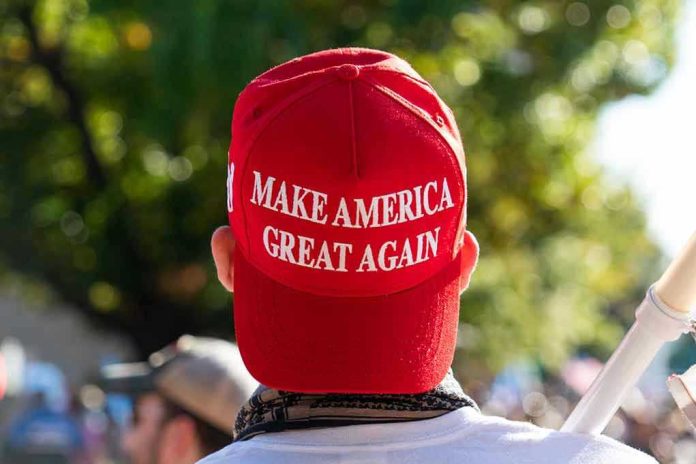
A St. Louis soccer fan’s removal over a MAGA hat has reignited a national debate on free expression, equal treatment, and the boundaries of political messaging in American sports venues.
Story Highlights
- A fan was ejected from a Major League Soccer game for wearing a “Make America Great Again” hat, sparking national controversy.
- The stadium cited a non-political messaging policy, yet reportedly allowed other symbols such as pride flags to be displayed.
- The Department of Justice’s Civil Rights Division is now reviewing the incident for potential rights violations.
- The case highlights ongoing concerns about selective enforcement and free speech in public spaces.
Fan Ejected Over MAGA Hat Sparks Civil Rights Review
On August 2, 2025, Michael Weitzel attended a St. Louis City SC Major League Soccer match at Energizer Park wearing a red “Make America Great Again” hat. During the game, security personnel approached and ultimately asked Weitzel to leave the stadium, citing the venue’s non-political messaging policy. Video of the incident circulated widely on social media the following day, showing Weitzel questioning the policy and referencing the presence of other symbols in the stands, such as pride flags and banners. The video’s rapid spread fueled immediate public debate and media coverage, placing a spotlight on the stadium’s enforcement practices and the broader issue of political expression at sporting events.
Security staff justified Weitzel’s removal by invoking the stadium’s code of conduct, which prohibits political banners but does not explicitly address hats or personal attire. The lack of clarity in the written rules, combined with Weitzel’s claims that other political or social symbols were permitted, led to accusations of inconsistent and possibly discriminatory enforcement. According to news reports, Weitzel was threatened with arrest if he did not comply with the order to leave, intensifying concerns about the proportionality of the response and the protection of individual rights in publicly accessible venues.
Stadium Policies and Potential Double Standards
The incident has drawn attention to the Major League Soccer (MLS) fan code of conduct, which aims to create a safe and inclusive environment by prohibiting banners and disruptive political behavior. However, the policy is less explicit about personal clothing or accessories, leading to ambiguity in enforcement. Critics argue that the selective application of these rules—permitting some symbols while excluding others, particularly those associated with conservative or pro-Trump viewpoints—undermines the stated goal of inclusivity and may constitute viewpoint discrimination.
Legal experts and sports commentators have pointed out that while private venues generally have discretion over their policies, the uneven application of such rules, especially in settings open to the public and often supported by taxpayer funds, raises significant civil rights concerns. The Department of Justice’s Civil Rights Division is now reportedly reviewing the case to determine whether Weitzel’s rights were violated under federal law, a move that could have far-reaching implications for how political expression is treated in public accommodations across the country.
National Reaction and Broader Implications
The removal of a fan for wearing a MAGA hat has quickly become a flashpoint in the ongoing battle over free speech, political expression, and equal treatment in American society. Supporters of Weitzel argue that the incident exemplifies a growing intolerance for conservative viewpoints in public life and sports, where displays perceived as left-leaning or “woke” are tolerated, while right-leaning symbols are censored or punished. This perception has fueled frustration among many Americans who see such actions as a direct threat to fundamental constitutional rights and core values of fairness.
On the other hand, defenders of the stadium’s actions maintain that sports venues have a right to enforce non-political policies to prevent disruption and maintain a family-friendly atmosphere. However, the challenge of defining what counts as “political” remains central to the controversy. Legal scholars emphasize that policies must be clear, consistently enforced, and non-discriminatory, especially in facilities that serve the general public. The outcome of the DOJ review could set a precedent for how sports leagues and venues nationwide address political symbols, influencing future policies and the balance between order and individual rights.
Looking Ahead: Policy, Precedent, and Public Trust
The case has already prompted calls for greater transparency and fairness in how sports leagues and stadiums handle political expression. If the Department of Justice determines that Weitzel’s removal constituted a civil rights violation, MLS and other professional sports organizations may be compelled to revise their codes of conduct to ensure that policies do not infringe upon free speech or target specific viewpoints. Fans, especially those with strong political beliefs, are watching closely to see whether their voices and rights will be respected in public spaces funded by their tax dollars.
The controversy also raises broader questions about the role of sports in American culture and the extent to which venues can and should police political expression. As the nation continues to grapple with polarization, the need for equal treatment and respect for constitutional freedoms remains a central concern. The St. Louis incident, now under federal scrutiny, may become a defining moment in the ongoing debate over free speech, fairness, and the values that unite Americans both on and off the field.



